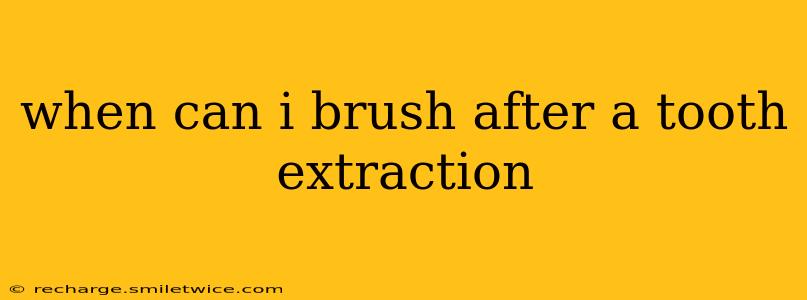When Can I Brush After a Tooth Extraction?
Having a tooth extracted can be a bit unsettling, and knowing when you can resume your normal oral hygiene routine is a top priority. The answer isn't a simple "24 hours" – it depends on several factors, and rushing the process can lead to complications. This guide will help you understand the best practices for brushing after an extraction, answering common questions and addressing potential concerns.
Understanding the Healing Process:
After a tooth extraction, a blood clot forms in the socket where the tooth was removed. This clot is crucial for proper healing and preventing a painful, potentially serious complication called "dry socket." Disturbing this clot too early can dislodge it, leading to dry socket, characterized by intense pain, bad breath, and a visible empty socket.
The Crucial First 24 Hours:
In the first 24 hours after your extraction, it's essential to avoid any activity that could dislodge the blood clot. This includes:
- Brushing near the extraction site: Avoid brushing directly over the extraction site for at least 24 hours. Focus on gently brushing the rest of your teeth to maintain good oral hygiene.
- Rinsing vigorously: Avoid forceful rinsing, spitting, or using a straw, as the suction can dislodge the clot.
- Smoking or using tobacco products: These significantly increase the risk of dry socket and hinder healing.
- Touching the extraction site: Avoid poking or prodding the area with your tongue or fingers.
Gentle Brushing After 24 Hours:
After the initial 24-hour period, you can gradually resume brushing, but proceed with caution:
- Soft-bristled brush: Use a soft-bristled toothbrush to minimize irritation.
- Gentle brushing: Brush gently around the extraction site, avoiding direct contact with the socket as much as possible.
- Focus on surrounding teeth: Prioritize brushing the teeth adjacent to the extraction site to prevent the buildup of food particles and bacteria.
When to See Your Dentist:
It's crucial to contact your dentist or oral surgeon immediately if you experience any of the following:
- Severe pain: Pain that doesn't improve with over-the-counter pain relievers.
- Excessive bleeding: Bleeding that persists for several hours or soaks through multiple gauze pads.
- Signs of infection: Swelling, redness, pus, or fever.
- Dry socket symptoms: Intense pain, bad breath, visible empty socket.
Frequently Asked Questions (FAQs):
H2: How long should I wait before brushing after a wisdom tooth extraction?
The same 24-hour rule generally applies to wisdom tooth extractions. The healing process is similar, and avoiding disturbance to the blood clot remains paramount. After 24 hours, gently brush around the area, using a soft-bristled brush.
H2: Can I use mouthwash after a tooth extraction?
You should avoid using mouthwash for at least 24 hours after your extraction. Some mouthwashes can disrupt the blood clot formation. After 24 hours, you may use a diluted salt-water rinse (1/2 teaspoon of salt in 8 ounces of warm water) to gently cleanse the area. However, always check with your dentist or oral surgeon for their specific recommendations.
H2: What if I accidentally brush near the extraction site too early?
While accidental brushing near the extraction site within the first 24 hours might not automatically cause dry socket, it increases the risk. If this happens, monitor the area carefully for any signs of infection or dry socket (severe pain, bad breath, visible empty socket). Contact your dentist immediately if you notice any concerning symptoms.
H2: How long does it take to fully heal after a tooth extraction?
Full healing after a tooth extraction typically takes several weeks, although the initial healing and blood clot formation are most crucial in the first few days. The bone will continue to heal and remodel for several months.
Remember, following your dentist's post-operative instructions carefully is key to a smooth recovery. If you have any concerns or questions, don't hesitate to contact your dentist or oral surgeon. They're your best resource for personalized advice and ensuring your healing process goes as smoothly as possible.
